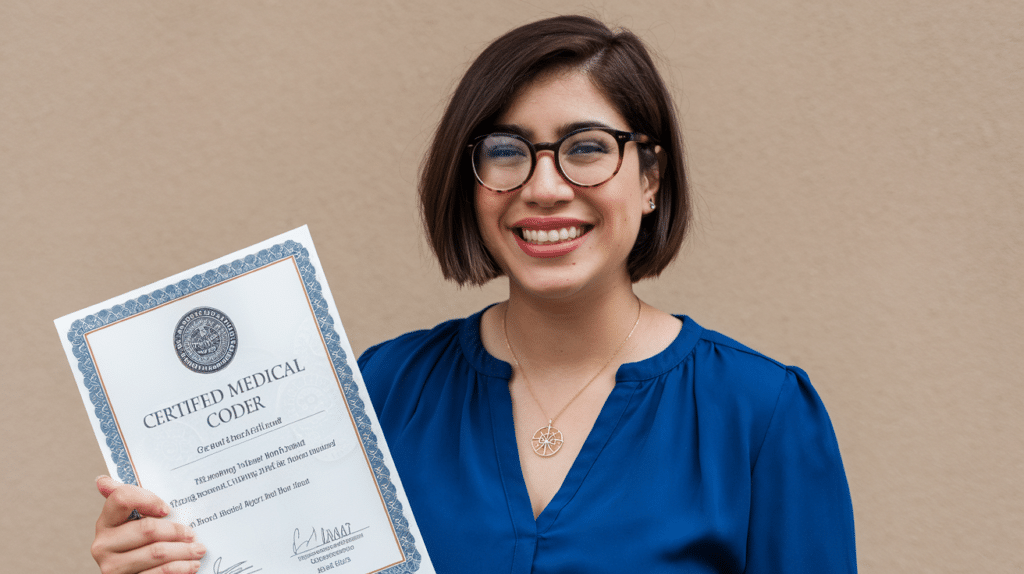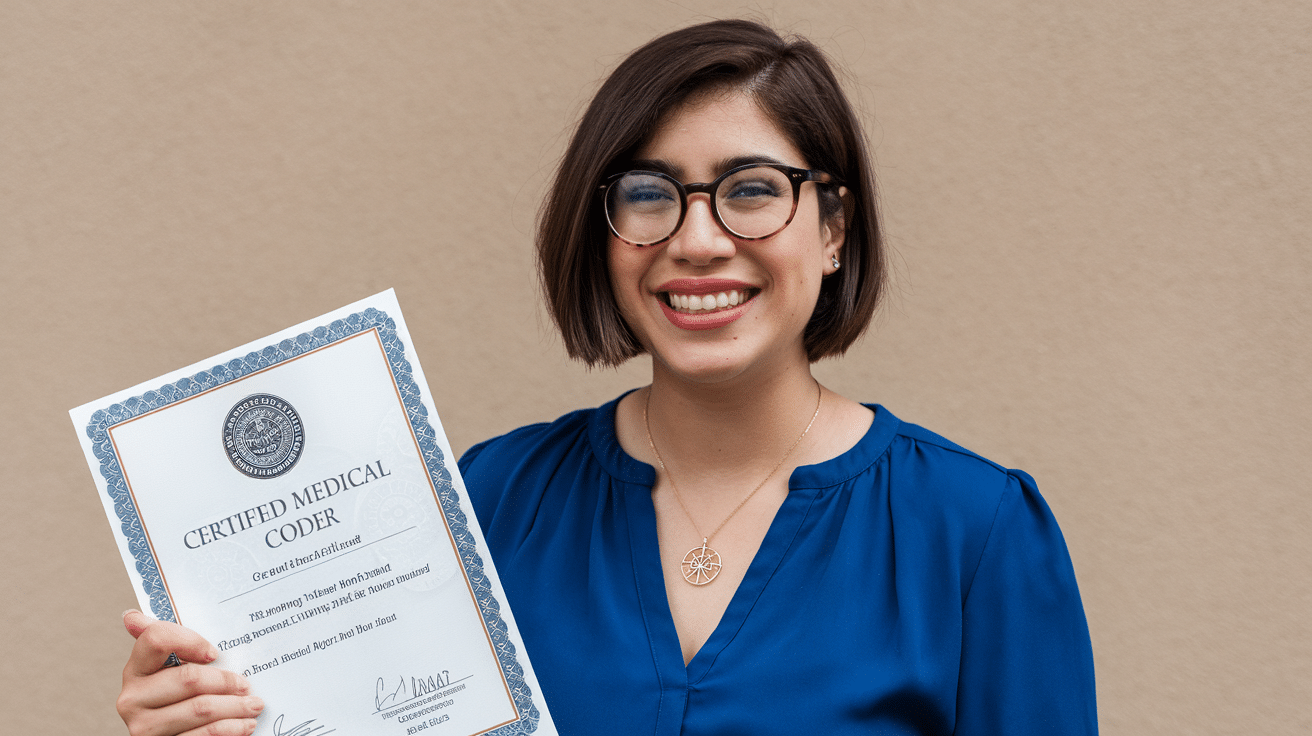Are you considering a career in medical coding?
Understanding certification requirements is an important first step.
As you explore this field, you will likely have questions about the certification process, its importance, and the various pathways available.
Medical coding certification opens the door to a dynamic healthcare career – one that doesn’t require years of medical school training.
Why is certification so significant?
As healthcare systems continue to evolve, certified medical coding professionals have become indispensable. These specialists transform complex medical documentation into standardized codes, enabling:
- Accurate billing processes
- Efficient insurance claims processing
- Valuable healthcare analytics
The path to certification, however, can be complicated.
Multiple accrediting bodies exist. Different certification types are available. Training programs vary in scope and focus. For professionals entering the field, having reliable guidance is essential to making informed career decisions.
This article will walk you through:
- The fundamental aspects of medical coding certification
- Various certification options and their requirements
- How to choose the right program for your career goals
- Steps to establish yourself in this growing field
Whether you’re just starting your research or ready to pursue certification, this article will provide the clarity you need to move forward with confidence in your medical coding career.
So let’s get started.

What is Medical Coding Certification?
A medical coding certification is your professional validation – an industry-recognized credential that verifies your expertise in translating healthcare procedures, diagnoses, and services into standardized codes.
In the world of medical coding, a certification is far more than just a document hanging on your wall.
To get a certification you have to pass an exam. Your formal training should ideally prepare you for the certification exam.
Organizations like the American Academy of Professional Coders (AAPC) issue such certifications.
The certification exam is designed to be both challenging and comprehensive. It goes beyond simple multiple-choice questions, testing your ability to apply theoretical knowledge to real-world scenarios.
Typically, this involves a rigorous preparation process, including extensive study, practical training, and a thorough grasp of medical coding guidelines.
Why Does Certification Matter?
As healthcare systems become more complex and data-driven, medical coding certification ensures that you are skilled in coding, something that directly impacts patient care.
Plus, certified medical coders could gain many professional benefits, including credibility, easier career advancement, and higher earning potential.
But, do you really need a Medical Billing and Coding certification?
We’ve seen this common question from a lot of aspiring billers and coders:

Our answer is: Yes! you do require a certification.
Employers highly prioritize medical coders who are certified, and certification typically leads to salary increases, access to specialized roles, and improved job market competitiveness.
According to a survey completed by the American Academy of Professional Coders (AAPC) in 2024, certified medical billers and coders earn 16.6% more than their non-certified colleagues.

What is the Difference Between a Medical Coding Certificate and a Medical Coding Certification?
If you’re exploring a career in medical coding, you’ve probably come across the terms medical coding certificate and medical coding certification.
While both these terms may sound similar, they are quite different and play different roles in shaping your career in the healthcare industry.
A certificate is an educational credential that is awarded after you complete a training program that teaches basic medical coding skills, typically lasting months to years.
A certification, on the other hand, is a professional credential awarded by organizations like AAPC after passing a certification exam.
A certificate might demonstrate your foundational knowledge in medical coding, but a professional certification goes several steps further—it validates your expertise, showcases your commitment to the field, and significantly enhances your career prospects in the healthcare documentation landscape.
Let us break down the key differences between these two, and discuss why they matter.

How To Get a Medical Coding Certification?
Now coming straight to the point, what are the steps you need to take to get certified as a medical coder?
Here’s a step-by-step guide on how to get your medical coding certification:
Step 1 -> Obtain a High School Diploma or GED Equivalent
The first step in starting your journey as a medical coder is to have a high school diploma or equivalent (GED). This is a prerequisite for enrolling in medical billing and coding training programs.
Step 2 -> Enroll in a Medical Billing and Coding Program from an Accredited Institution
The next step is to enroll in a training program that provides the necessary education in medical coding.
You should ideally opt for a program offered by an accredited source to ensure the quality of education.
Completing your training from an unaccredited source could raise red flags in the eyes of employers.
Online, self-paced medical billing and coding training programs, that are offered from accredited sources, could be beneficial for adult learners balancing work or family responsibilities.
Step 3 -> Gain Experience Through an Externship
Practical experience is essential in this field. Some programs typically include externship opportunities, allowing you to apply your coding skills in real-world healthcare settings such as hospitals, clinics, or billing offices.
This hands-on experience not only prepares you for the certification exam but also makes you job-ready.
Step 4 -> Apply for Certification Like the CPC
The CPC certification is one of the most popular entry-level options for medical coding, making it a great choice to start towards your career and potentially boost your earnings.
The general requirements for the CPC certification exam include:
- Completion of a medical billing and coding training program.
- Practical experience (minimum 2 years) in the field.
The Certified Professional Coder (CPC) credential from the American Academy of Professional Coders (AAPC) is widely regarded as the gold standard for entry-level medical coding certification.
It covers outpatient and professional coding across multiple medical specialties, providing aspiring medical coders with a foundation in medical terminology, anatomy, and coding guidelines.
Additionally, the CPC certification is highly respected by employers, making it an excellent launching pad for a promising career in medical coding.
To pursue the Certified Professional Coder (CPC) (or similar credentials), you must meet specific eligibility requirements set by the certifying body, the American Academy of Professional Coders (AAPC).
Here’s something important to know: According to AAPC, if you don’t have 2 years of medical coding experience, you’ll get the CPC-A (Apprentice) certification instead of the CPC certification.
You can earn the full CPC certification after gaining 2 years of work experience.
However, if your training program includes at least 80 hours of coding prep, you only need 1 year of experience to remove the A (Apprentice) status.
There are certain medical coding and billing programs that could help you meet the certification requirements so you become ready for CPC certification.
Step 5 -> Prepare and Sit for the Exam
Prepare for the certification exam by thoroughly reviewing the coding systems, healthcare regulations, and anatomy, which will be covered during your training.
The exam format typically includes multiple-choice questions and scenarios to assess your coding accuracy.
Step 6 -> Pass the Exam and Get Certified
After successfully passing the certification exam, you’ll receive your certification, such as the CPC-A credential.
So, we hope you now understand how to get medical coding certification.

But, now you might ask yourself:
What is the Best Certification for Medical Billing and Coding?
This is a common dilemma faced among aspiring medical billers and coders, especially since there are quite a few certifications to choose from.
The most common certifications for medical billers and coders include:
- CPC (Certified Professional Coder) – AAPC
- CCS (Certified Coding Specialist) – AHIMA
- RHIA (Registered Health Information Administrator) – AHIMA
- RHIT (Registered Health Information Technician) – AHIMA
- CBCS (Certified Billing and Coding Specialist) – NHA
So it’s understandable why you must be wondering: which of these should you choose?
To answer your question simply, choosing the best certification for medical coding and billing depends largely on your career aspirations, the work environment you prefer, and the specific skills you aim to master.
Certifications like the CPC and the CBCS are both good choices.
However, we believe that the Certified Professional Coder (CPC) credential, offered by the American Academy of Professional Coders (AAPC), stands out as the most popular choice for entry-level medical coders.
So, if you’re looking to establish a strong foundation and maximize your earning potential in medical coding and billing, we would recommend the CPC certification.
New graduates or those without two years of medical coding experience will initially receive a CPC-A (Certified Professional Coder – Apprentice) certification from the AAPC.
But don’t worry, in the next section, we will introduce an online program that is designed to help you seamlessly transition to the full CPC certification.
Introducing:
Preppy’s Online Medical Billing & Coding Training Program
If you’re wondering how you could prepare for the CPC certification in less than a year, you’ve come to the right section.
Preppy offers an online medical billing and coding training program designed to fit perfectly into the lives of busy adult learners.
Here is why Preppy could be a great choice for you:
1. 100% Online, Self-Paced Learning
Preppy’s 100% online format allows students to learn at their own pace, making it ideal for those juggling work, family, or other commitments.
There are no fixed class schedules or commutes, giving learners complete control over their education.
You will have access to the program for a full year, and the program can be completed in as little as six months.
2. CPC Exam Preparation
Preppy ensures students are also prepared for the Certified Professional Coder (CPC) exam, a widely recognized certification in the medical coding industry.
This certification not only boosts career prospects but also enhances earning potential.
By now we know that if you take the CPC without having relevant experience, you will be awarded a CPC – A certification.
Preppy’s program covers the 80 contact hours required by AAPC.
This means you’ll only need one year of work experience to remove the “-A” from your CPC-A certification and earn the full CPC.
By enrolling with Preppy, you can cut the required experience in half—just one of the many great benefits of this program!
3. Hands-on learning with an Externship Opportunity
Preppy also offers externship opportunities towards the end of the program.
This allows you to potentially get real-world experience, applying the coding and billing skills you have learned in a healthcare setting.
4. Recognized Certification from an Accredited University
When you enroll in Preppy’s program, you receive a certificate of completion from a prestigious non-profit university.
In healthcare, having a university certificate could look great on your resume.
With Preppy, you get a certificate from an accredited university without the need to enroll in a traditional college program. Sounds really good, right?
There’s more!
5. Affordable Tuition and Faster Completion
With a tuition fee of only $1,599, Preppy is one of the most cost-effective alternatives to traditional programs, which can cost anywhere between $7,000 and $40,000.
The accelerated pace of the program allows you to complete your training in as little as six months, which could make it possible to start towards earning sooner and avoid significant student debt.
6. Bonus Perk- FREE LAPTOP!
A great perk that Preppy also offers is a laptop as a bonus, if you pay in full during enrollment.
So, if you’re ready to start towards your career as a medical coder or biller and want a program that balances quality, affordability, and flexibility,
Preppy’s Online Medical Billing and Coding Training Program could be the right fit for you.
Learn more about Preppy’s program here.
Types of Medical Coding Certifications
As we mentioned earlier, the CPC certification is one of the best certifications you could go for as an entry-level medical coder.
However, if you want to advance further in your medical coding career, here are a few certifications you can look into, such as:
1. Certified Coding Specialist (CCS)
- Offered by: AHIMA
- Ideal For: Coders focusing on hospital-based settings and inpatient coding.
- The exam costs $399 for AHIMA members and $499 for non-members.
- An optional AHIMA membership costs $199 per year and gives you discounts on the exam and other benefits.
- The exam includes multiple-choice and scenario-based questions focused on topics like ICD-10-CM/PCS coding, reimbursement methods, and coding guidelines.
- To be eligible, you must complete an AHIMA-approved coding program and have 2 years of coding experience.
- You’ll also need a coding credential, such as RHIT or RHIA, to qualify.
- To pass, you need a score of 300 out of 400.
- To maintain your certification, you must renew annually by paying the membership fee and earning 20 CEUs every two years.
2. RHIA (Registered Health Information Administrator – AHIMA):
- Offered By: AHIMA
- Ideal For: Individuals looking to manage health information systems and lead health information teams.
- The exam costs $229 for AHIMA members and $299 for non-members.
- An optional AHIMA membership costs $199 per year and offers discounts on the exam and other benefits.
- The exam features multiple-choice and case-study-based questions, covering topics like data analytics, health informatics, legal compliance, and health record management.
- To be eligible, you need a bachelor’s degree in Health Information Management (HIM) from a CAHIIM-accredited program.
- To pass the exam, you need a score of 300 out of 400.
- To renew your certification, you must pay the annual membership fee and earn 30 CEUs every two years.
3. Registered Health Information Technician (RHIT)
- Offered By: AHIMA
- Ideal For: Professionals specializing in coding, billing, and management of medical records.
- The exam costs $229 for AHIMA members and $299 for non-members.
- AHIMA membership is optional and costs $199 per year, offering discounts on the exam and other benefits.
- The exam features multiple-choice questions covering medical coding, quality assurance, and health record systems.
- To be eligible, you must have an associate degree in Health Information Management (HIM) from a CAHIIM-accredited program.
- You need a score of 300 out of 400 to pass the exam.
- To keep your certification, you must renew annually by paying the membership fee and earning 20 CEUs every two years.
4. Certified Billing and Coding Specialist (CBCS)
- Offered By: NHA
- Ideal For: Entry-level professionals in billing and coding for physicians’ offices, clinics, and outpatient settings.
- The exam costs $117, though the price may vary if purchased with study packages.
- No membership is required for certification, but optional study materials may have additional costs.
- The exam includes 110 questions total (100 scored and 10 pretest), covering topics like medical billing, coding procedures, and HIPAA compliance regulations.
- To be eligible, you need a high school diploma or equivalent and must complete a medical billing and coding training program.
- The passing score is scaled, with detailed results provided after the exam.
- You need to renew your certification every two years and earn 10 CEUs in each renewal cycle.

FAQS: Medical Coding and Billing Certification
Medical Coders: Who Are They? And What Do They Do?
Imagine you’re a translator, but instead of converting languages, you’re converting medical information into a universal code that healthcare systems understand.
That’s exactly what medical coders do!
They’re the healthcare professionals who take complicated medical reports and transform them into a standardized language of numbers and letters.
Their job is to take all that medical jargon and translate it into precise, standardized codes.
Let’s understand their duties in a bit more detail.
Medical Coder Job Duties
Here’s what medical coders actually do:
- Medical Record Decoding-
- Review patient charts and medical documentation
- Extract critical medical information
- Translate medical procedures and diagnoses into specific codes
- Code Assignment-
- Use specialized coding systems like ICD-10, CPT, and HCPCS
- Ensure each medical service is accurately represented by a unique code
- Maintain incredible attention to detail (we’re talking microscopic-level precision!)
- Healthcare System Support-
- Help healthcare providers get properly reimbursed
- Ensure insurance claims are processed smoothly
- Contribute to medical billing and administrative processes
What is the career outlook for Medical Coders?
The career outlook for medical coders looks positive, with steady demand across the healthcare industry.
According to the U.S. Bureau of Labor Statistics (BLS), the employment of medical records specialists, which includes medical coders, is projected to grow by 9% from 2022 to 2033, much faster than the average for all occupations.
This growth is driven by the healthcare sector’s expansion and the need for accurate patient data management and billing services.
Medical coders also generally have competitive salaries. The median annual wage for medical records specialists was approximately $48,780 as of 2023, with the top 10% earning over $77,000 annually.
Employment opportunities are particularly abundant in hospitals, physician offices, and outpatient care centers, with the potential for remote positions offering added flexibility.
For aspiring medical coders, obtaining certification, such as the CPC (Certified Professional Coder), enhances job prospects and earning potential.
Employers prioritize certified candidates due to their demonstrated expertise and readiness for the field.
Is a Career in Medical Coding Worth It?
A career in medical coding can definitely be worth it, especially given the current demand for qualified professionals in the healthcare industry.
Here are some reasons why medical coding is considered a good career choice:
1. Growing Job Market
According to the U.S. Bureau of Labor Statistics (BLS), employment for medical records specialists, including medical coders, is expected to grow by 9% from 2022 to 2033, which is faster than the average for all occupations.
This growth is fueled by an expanding healthcare sector, particularly as the population ages and more individuals require healthcare services. Medical coders are essential in ensuring that healthcare claims are processed accurately and efficiently.
2. Job Stability and Flexibility
Medical coding offers job stability, with positions available in hospitals, physicians’ offices, and insurance companies.
Additionally, the option for remote work in many coding roles adds flexibility, making it an attractive career for those seeking work-life balance. The demand for medical coders is not likely to decrease anytime soon, ensuring long-term career prospects.
3. Good Earning Potential
The median annual wage for medical records specialists, including medical coders, was $48,780 as of 2023, with the top 10% earning more than $77,000 annually.
While salaries vary based on location, experience, and certification, many medical coders earn competitive pay, especially with additional credentials like the CPC (Certified Professional Coder).
4. Low Barrier to Entry
One of the significant advantages of a career in medical coding is that it typically requires minimal upfront education. Many medical coders can enter the field with a certificate or diploma, which can be completed in a relatively short time, often through online programs.
This makes medical coding an appealing option for those looking to enter the healthcare field without the time and expense of a traditional four-year degree.
Are Online Medical Coding Training Programs Legit?
Yes, online medical coding training programs are legitimate, but it’s important to choose one that meets certain standards.
Here’s what to look for:
1. Accreditation: Ensure the program is through an accredited source. This ensures the program meets industry standards and prepares you for certification exams such as the CPC.
2. Certification Preparation: A legitimate program should ideally help you prepare for widely recognized certifications like the Certified Professional Coder (CPC), which is crucial for employment in the field.
3. Clear Pricing: Ensure the program’s cost is transparent and competitive with other training options.
How To Become a Medical Coder?
To become a medical coder, follow these key steps to ensure you’re well-prepared for a successful career in the field:
Education and Training
The first step is to obtain the necessary education, which can be done through a program that has an accredited source.
You can choose between associate degree programs, diplomas, or online certification programs.
Online self-paced programs have become particularly popular due to their flexibility, allowing students to balance other responsibilities.
Obtain Certification
While certification is not always mandatory, many employers prefer or require it.
The Certified Professional Coder (CPC) credential from the AAPC is one of the most recognized certifications in the industry.
Preparing for this certification typically involves completing a formal training program followed by passing an exam that tests your coding knowledge and accuracy.
Certification not only boosts your employment prospects but also helps improve your earning potential.
Gain Experience
Gaining hands-on experience through externships or internships can be invaluable.
Practical experience helps reinforce what you’ve learned and makes you more attractive to employers. Some training programs, like Preppy’s, offer externship opportunities to ensure you gain real-world experience.
And that’s it, you’ll be now set to start applying for entry-level medical coder positions.
Read More:
- Medical Billing and Coding Classes Online
- Medical Billing and Coding Training
- 4 Week Online Course For Medical Coding and Billing
medical coding





